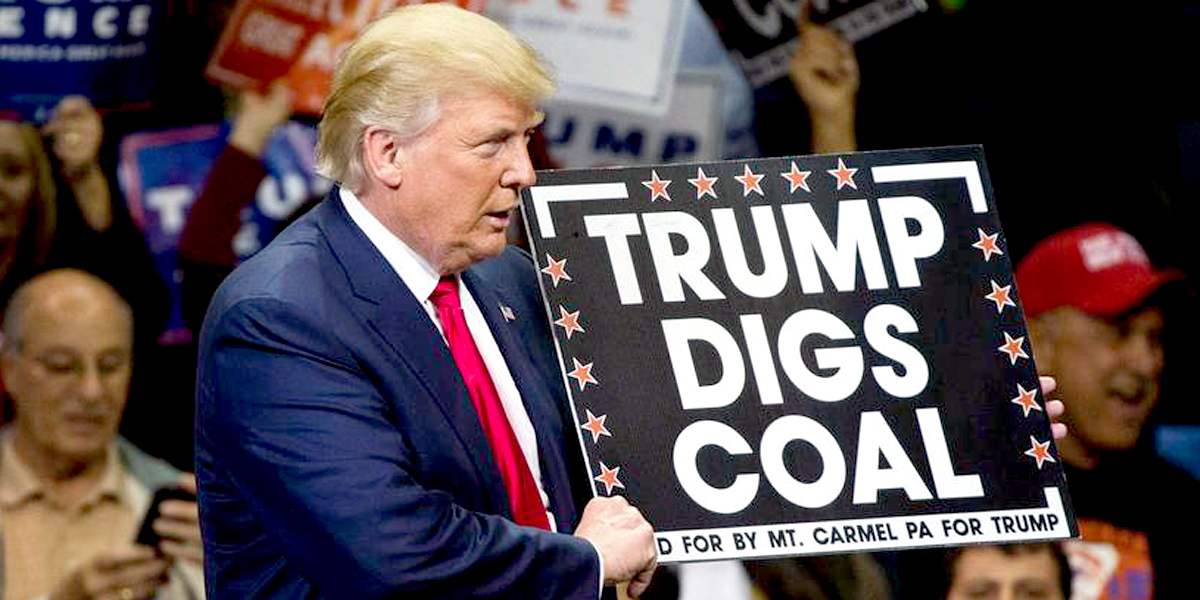
Trump Wins, Renewable Energy Investments Lose and Dirty Energy Stocks Surge

Political upheaval has major influence over the stock markets, and with climate-change-denying Donald Trump’s “disaster” of an election win, renewable energy investment is looking bleak at the moment as dirty energy surges.
Really?! What is happening?! Leo needs to have a word #TrumpDigsCoal #ClimateChange #BeforeTheFlood #USElection2016 pic.twitter.com/tbqAbpIRn3
— Stacey Goater (@StaceyGoater) November 9, 2016
The world’s top coal trader Glencore Plc rose more than 5 percent today while the world’s biggest wind-turbine maker Vestas Wind Systems A/S fell about 13 percent, according to Bloomberg. Solar companies First Solar, SunPower and SolarCity were down a respective 6 percent, 17 percent and 6 percent this morning. Shares in European renewable energy equipment makers and utilities with significant investments in the U.S. have fallen as much as 10 percent, Reuters reported.
As Bloomberg warned in its report, “the swing foretells a story of fossil fuels making a comeback, while the fight against climate change—and investment in wind and solar power—languishes.”
Our president-elect—who literally said “the wind kills all your birds” and solar is “not working so good”—has made no bones about his support of dirty energy, from his ties to the controversial Dakota Access Pipeline to his pledge to bring back the dirtiest fuel on the planet, coal.
The U.S. wind power industry is “bracing itself for an uncertain future following the election of Donald Trump to the presidency,” staff from Wind Power Monthly wrote in a column today. The publication quoted Trump’s plans to “unleash America’s $50 trillion in untapped shale, oil, and natural gas reserves, plus hundreds of years in clean coal reserves.”
'Trump's Election Is a Disaster' by @StefanieSpear of @EcoWatch: https://t.co/jjnWs7tWQX#GameOverForClimate
— Prof Michael E. Mann (@MichaelEMann) November 9, 2016
Meanwhile, crude oil prices have wavered between gains and losses as investors are uncertain over the president-to-be’s energy plans. Experts explained that while Trump would likely scale back regulations and encourage drilling, that plan would effectively keep oil prices low due to a global oil glut.
“It probably ends up not being all that supportive for prices because supply will be ample,” Bill O’Grady, chief market strategist at Confluence Investment Management, told The Wall Street Journal. “But the oil companies themselves will be thrilled.”
With the legislative and (likely) the judicial branch as trump cards, the 45th President of the United States stands to sully much of President Obama’s environmental legacy, especially Obama’s landmark Clean Power Plan to cut greenhouse gas emissions from power plants.
“Under the [Clean Power Plan] and current renewables incentives, most U.S. utilities are opting to replace retiring coal plants with wind and solar facilities,” Utility Dive’s Gavin Bade wrote. “But without those programs, the investment situation may start to look different for many utilities. Whereas Hillary Clinton was likely to build upon existing regulations on power sector pollution, the promise of less stringent rules could increase the appeal of fossil fuel assets.”
Here's What #Trump Would Do in His First 100 Days https://t.co/dPfOhlj3Gf @ClimateNexus @billmckibben @MichaelEMann @kxlblockade @janekleeb
— EcoWatch (@EcoWatch) October 24, 2016
Alexandre Andlauer, head of oil at research firm Alphavalue in Paris, told Bloomberg that “the oil and gas industry is a clear winner with the new president. U.S. Oil companies have a better future today than yesterday.”
On the federal level, clean energy development and policies are unlikely. Trump has spoken of dismantling the U.S. Environmental Protection Agency (EPA) and renegotiating the Paris agreement. He will will likely stack his cabinet with pro-business and pro-fossil fuels appointees. According to POLITICO, potential names in the hat for Interior Secretary includes Lucas Oil co-founder Forrest Lucas; venture capitalist Robert Grady, a George H. W. Bush White House official with ties to New Jersey Gov. Chris Christie; former Alaska Gov. Sarah Palin; former Arizona Gov. Jan Brewer; Oklahoma Gov. Mary Fallin; Wyoming Rep. Cynthia Lummis (R); and Oklahoma oilman Harold Hamm. Both Hamm and Grady are also considered potential picks for Energy Secretary. On Trump’s list for EPA administer is Competitive Enterprise Institute’s Myron Ebell, a well-known climate skeptic who is leading Trump’s EPA transition team.
Federal tax incentives for solar and wind might also be at risk. Christian Roseland of PV Magazine warned that Trump and his Republican government can decide to “pre-emptively end the 30 percent solar Investment Tax Credit (ITC), which was recently extended to 2020.”
However, there is one silver lining. Roseland noted that “if there is a saving grace, it is that other than the ITC the most important policies for solar are at the state and not the national level. Trump’s presidency will not undo the renewable portfolio standards in California or New York, or the implementation of PURPA in North Carolina and Utah.”
States, a clean energy future might be up to you.

 233k
233k  41k
41k  Subscribe
Subscribe 